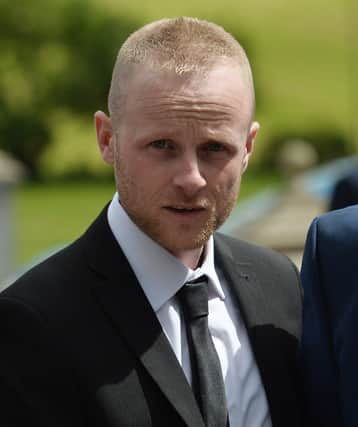NAMA case: Loyalist Jamie Bryson to take legal battle to Supreme Court


Jamie Bryson confirmed the new move in his legal battle against being returned for trial on a charge of conspiracy to commit misconduct in public office.
Proceedings relate to the sale of the National Asset Management Agency (Nama)’s Northern Ireland property loan portfolio to US investment giant Cerberus.
Advertisement
Hide AdAdvertisement
Hide AdLast month senior judges in Belfast rejected a challenge brought along with his co-accused, the former Sinn Fein MLA Daithi McKay.
Mr Bryson has now requested permission to contest their determination at the UK’s highest court.
He said: “I can confirm that this week an application for leave to appeal to the Supreme Court has been lodged in the challenge to the decision to return for trial in the Nama case.”
In September 2015 Mr Bryson gave evidence at the Stormont Finance Committee inquiry chaired by Mr McKay.
Advertisement
Hide AdAdvertisement
Hide AdUsing parliamentary privilege, he made an unsubstantiated allegation about who was set to profit from the £1.2bn deal.
Following a police investigation Mr Bryson, Mr McKay, and Sinn Fein member Thomas O’Hara were all charged with conspiracy to commit misconduct in public office.
The prosecution centres on Twitter messages they allegedly exchanged before the evidence-giving session.
High Court challenges were mounted after a district judge determined earlier this year that they should stand trial at the Crown Court.
Advertisement
Hide AdAdvertisement
Hide AdLawyers for Mr Bryson and Mr McKay argued that a change in the specific of the charge rendered the committal process unfair.
It was also contended that there was insufficient evidence, and that the decision breached the European Convention on Human Rights.
During a two-day hearing judges were told any Twitter messages do not establish a criminal offence of misconduct in a public office.
Mr Bryson’s barrister claimed it was a miscarriage of justice to return someone for trail on an offence which does not exist.
Advertisement
Hide AdAdvertisement
Hide AdThe high-profile loyalist was merely telling the truth on an issue of public importance, the court heard.
But counsel for the prosecution described the challenge as a dangerous attempt to thwart and end the criminal process.
He insisted a trial is necessary to examine any alleged attempts to subvert the Stormont inquiry, with legal safeguards available in the Crown Court.
Both legal challenges were dismissed after judges held there was enough evidence to justify committing them for trial.
Advertisement
Hide AdAdvertisement
Hide AdLady Chief Justice, Dame Siobhan Keegan, stressed no view was being taken on the ultimate outcome of the prosecution.
But in her judgment she held: “We cannot see that there was any unfairness or prejudice caused.”
Mr Bryson insisted that issues involving human rights law must now be determined by the Supreme Court.
He added: “As argued on my behalf during the challenge to the decision to return for trial, there can be no relevant criminality in giving good faith evidence on a matter of public importance.”